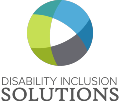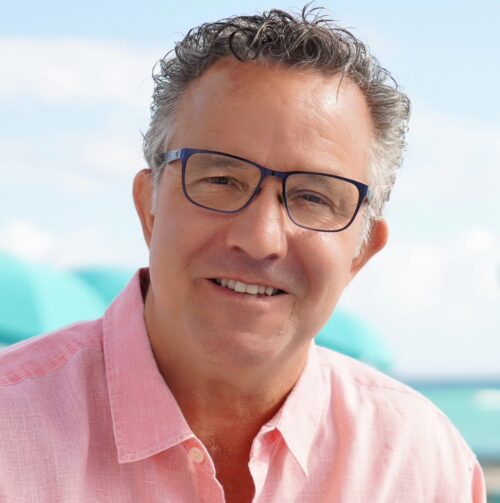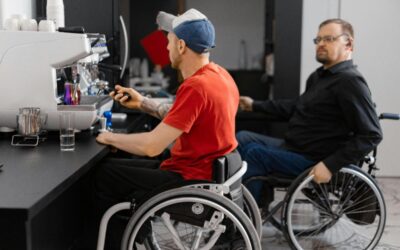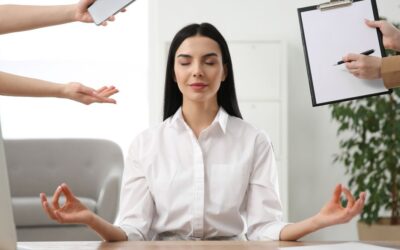Source: https://disabilityinclusion.com/blog/accessibility-matters-interview-with-andrew-houghton/
Transcript for Interview with Andrew Houghton, President of Disability Inclusion Solutions
Okay so Andrew as I look back on my research into who you are and what you’ve done I came across this quote that I think kind of defines the ground that you stand on and it’s a question from you are you participating fully in life or are you challenged by barriers I suspect you have some answers to that question and some suggestions as to how barriers can be uh evaded and maybe what we do is we start back in 1986
well of course 1986 was the um the year that I was drinking and driving and crashed my motorcycle into a palm tree but I think um you know that was just one significant event in my life um I think you have to go back um to my childhood you know I come from a broken family parents divorced at age nine and it wasn’t until recently that I came to understand how that that period in my life uh affected me as a human being um both you know emotionally mentally and eventually uh how it led to my behaviors um that that resulted in a motorcycle accident but uh you know my drinking started when I was much younger and it pretty much escalated uh to a period when I was 20 when I crashed my motorcycle and hit a palm tree but it was really kind of a tough period following that accident that I went through because you know I mean I spent three months in rehabilitation in northridge in southern california and back then three months was kind of the standard um you know I I always had a personality that I think was what I heard people tell me is infectious people tend to to um you know laugh at my silly jokes and and um and and they they like me and they want to help me maybe because they they were intuitive enough to know that i’ve come from a rough background and so they they were more inclined to want to help me but my doctors at the point at that point um you know thought out they’d be seeing me again because I was joking uh they thought i’d be back so they had concerns but when I left the hospital uh you know I promised them they’ll never see me again unless it’s for a regular checkup thankfully that never that that happened and I didn’t ever have to go back but I went through this period for several years of just kind of being lost going back to partying trying to rebuild my self-confidence I didn’t want to hang out with anybody I had known previously or grew grown up with with the exception of a couple of my closest friends so it was a really difficult time I put on a bunch of weight and and uh and and you know I was kind of in this limbo uh for several years uh following my accident but comes 1990 and it’s now four years later and there’s a place in california called big bear and you found your way there um tell us what happened then
well yeah uh there’s a uh a very uh well-known uh ADAptive sports program located in in big bear uh in the mountains and uh they offered snow skiing and I I saw an article on it and I you know I said what the heck I used to ski before my accident I was very active I mean I I surfed I played tennis I golfed I you know pretty much did everything a guy might do from southern california and uh and that’s one of the things that I lost after my accident so I found this skiing and I went up there and and it was like an enlightenment uh you know shown down upon me where I uh I was so free I mean I was out there on skiing even though it was this big old tank thing while they were training me uh I was able to you know scoot around the mountain and feel the exhilaration the wind in my face and falling and the challenge of of of success you know I knew you know I was frustrated I was yelling I was cussing but I knew that um i’ve seen other people you know flying behind me in their skis so it was not only good from an emotional uh standpoint to get back in in to something that that that I knew was part of my dna but I was also able to meet people people who were like me who had done a lot of things in life and so many of those people in from those early days are still my closest friends today and it really changed my perception of what was possible for a guy who lives now using a wheelchair for mobility you use the word possible i’ve heard that from other people
specifically from judy human in her book she talks about how accessibility opens the door to possibilities and the accessibility of ADAptive skiing that you found and later took on to water skiing and you know you became kind of a poster boy for for uh ADAptive sports endeavors uh however you found them and in 1996 you probably I i suspect you hit a turning point and you moved into the public eye you did a you’re on you were a cover boy or something on planet x wasn’t that uh something you did
oh well let me just say from 1990 to 1996 the trajectory was quite steep the evolution of my uh understanding and life in a wheelchair and it was very incremental so from that first time trying sports I happened to meet a guy um around that time um whose name was uh is bob yant uh he’s a quadriplegic and at the time um uh his family owned a medical supply company so it was my first real job back after my accident and I began selling medical supplies been hacking these supplies to people newly injured folks in in in rehabilitation hospitals so here I am i’m getting more involved in sports i’m learning more about the equipment uh I had an old rickety chair a folding chair when I got out of the hospital and I was introduced uh by the previous owner of of colors in a wheelchair to a manual wheelchair and these things just changed my life and my ability to integrate better into society so here I am i’m doing these sports um i’m out there talking uh at to to newly injured patients i’m telling them things that I haven’t yet even done and so i’m living through these newly injured patients and really inspiring them while inspiring myself to meet those expectations so over this a really six-year period i’m not only out there I became uh you know a speaker on sexuality and self-esteem and and uh and and then in 1996 um several things happened um I became the director of the ADAptive sports program at casa colina centers for rehabilitation um and I was invited to produce a couple shows on what was a 24-hour news station and so it was through that those shows on you know accessible parking and sports that the producer from this uh sports lifestyle show planet x came out so I i was able to get on the sports uh you know kind of uh uh I was one of the hosts one of the crazy hosts just kind of hey it’s andy here I am you know with a bunch of hot chicks we’re at the beach uh and and it really kind of helped get out the message uh because it was ADAptive sports integrated with all these other sports that were taking place um and it normalized normalized ADAptive sports at that time so there was a lot of things that kind of came together at once as a result of my um you know the the people who surrounded me and I think what they saw in me um I certainly wouldn’t be where I am if it wasn’t for all those folks who who you know wrote the art the first article on me in the orange county register that led to all these other things so it was really a a cool period of my life well the interesting thing is I mean you talked before about possibilities and now you’re talking about purpose uh how did you wind up in kosovo again as director of one of the the the largest competitive ADAptive sports programs in the country at the time uh I we would get calls all the time from folks about programs that were taking place and it was just through a phone call somebody said hey i’m putting together a trip um to the first trip was in 96 to bosnia and we’re looking for some sports equipment or some wheelchair equip you know ADAptive equipment so I was able to put together a bunch of equipment from donations we had a a bunch of stuff in our in our storage got some things donated put together a truck and went there as part of this this mission and it was at that point again where I met uh some ngos and some other organizations that were were working to improve the quality of the quality of life of those um that were either injured as a result of the conflict uh or had disabilities for other reasons and um and so I met a couple people and talked about a couple concepts and then a year later I returned with a group of um of seven uh gold medal winning uh athletes and we helped uh establish the ADAptive wheelchair sport basketball team uh in bosnia at the time we did a tour uh it was it was like something out of a movie our team traveled from region to region and they had a quasi-national team that traveled along with us they they aired our game our final game in tusla on live tv and our team played against their national team and they beat us it was an incredible moment and it was an incredible moment for the people with disabilities in bosnia at the time and then that led to me returning to kosovo through some other relationships I had into in 1990
i went in 1997 and then I went back in 1999 and spent six months there developing some programs so it was an incredible opportunity again to share some of my experiences to learn about what’s happening globally about you know with people with disabilities as a result of these conflicts and um to maybe leave a little bit of a legacy there for people that came behind those individuals who we were there to help so you started assuming kind of a public life which is interesting uh considering how it got started and you know uh uh
in 2001 didn’t you have something to do with the back to kosovo with the vietnamets in 2001 I went to kosovo with vietnam veterans of america foundation the primary objective of the program at the time was to help
build the infrastructure for sports and recreation for individuals with disabilities but you know can you you can imagine in an environment like that a post-conflict where you’ve got enclaves of you know serbian
folks and you know all of this disdain that still exists and here uh our primary objective through sports and recreation was really to build advocacy and to to bring people together around sports and recreation so we were able to help multiple organizations multiple different disability organizations we were able to help them by providing them equipment and infrastructure to you know advocate not only for the the benefits of the individuals who they respectively served but we got them advocating um with their municipalities uh you know how can we make the sports venues accessible uh so it was a really uh incredible experience and the people uh there have an incredible fortitude to succeed and and thrive and it was a great time so your public life continues uh and in there’s another man that’s going to get involved in your life and it’s george bush the president talk about that again here I mean i’m just an uh you know a green uh you know wet noodle really coming in I i’m just a guy who kind of things kind of just happened for me you know and I i you know i’m gonna take some credit for the work that i’ve done but um you know I really am not an expert at anything and and uh I think through my work abroad and others um in in early 2000 I think two I was contacted by um by you know the appointments office at the white house and of course you know the president doesn’t know anything about andy Houghton and it and they said hey i’ve got this opportunity for you it’s a federal agency called uh the javitswag javits wagnero day act it’s um at the time that’s what it was called and it’s a federal agency that employs 50 000 people with disabilities through the federal procurement program and I thought I don’t know sounds good and uh so I went through the process and um and I i was appointed in 2003 uh to this to this committee and I re i’ll never forget when I got there the the only thing uh that the the staff there in dc had was this article on me where uh you know it was kind of the dude with the long hair it was the one in the orange county register where I was self-proclaimed whatever and so they’re like who the heck is this surfer dude coming from southern california but as it turned out this was a very amazing really almost 10-year period of my life where I learned a lot about the challenges that people with the most significant disabilities face in achieving competitive integrated employment this is a 3 billion dollar program that employs a lot of people it’s very controversial because some individuals uh you know there’s a there’s a group who claim that people with disabilities working under this federal mandate uh are earning less than minimum wage and are segregated uh in in in segregated segregate uh um settings um so there was a lot of stuff going on I mean I was going to congress you know we were meeting with congressmen we were as part of the administration but somehow you know a few years in 2006 I became the first chairman of this 15 person committee the first chairman that had a this physical disability and the first private citizen it’s made up of of of executive level officers from the navy army military va social security and other key branches of government and our responsibility was to administer this three billion dollar program and provide oversight to ensure the integrity of the program so um I became the the first uh chairman which essentially is the head of the federal agency and then uh several years later I was voted again uh in as the chairperson and it was a really incredible opportunity to make a significant impact on a lot of people’s lives like what it’s a very complex program that was created in 1938 so um you know our one of my biggest areas of focus was the quality of the work life environment and the wages of the individuals with significant disabilities working in these programs so we worked hard to implement a quality of work life program that put accountability on the nonprofit organizations who were administering this program as well as the the two central nonprofit organizations who were responsible for administering the program to their respective non-profit organizations so with with that program we were able to analyze and measure the increase in in wages the increase in placements outside of the program into competitive integrated employment and and so that’s one of the things that i’m extremely proud of that we worked on there’s a lot of stuff that we did that I would just bore you to death if if I shared them with you would require an entirely new segment but I think just the fact that you had a guy with a disability there who had a passion to do the right thing was was in itself I think in motivating uh to others to want to kind of come around and and do the right thing so productivity uh out of that assignment you know led to a whole level of cultural uh repositioning and a lot of uh you know a lot of progress produced uh opening up accessibility to the people that you were trying to bring something good too
i was like the cog in the wheel yeah but yeah but you know I mean without without the cog where’s the wheel uh you know we’ve talked before and uh one of the times I commented that you were next to me next to you at your desk was a uh was a flag an american flag that was uh encased in a tribute box um how’d that get there
so you know in the federal government I guess when you you know serve for a period of time and and you move on to the next thing uh you know there there was uh some recognition for the work that I had done and one of the things that that would was was given to me uh when I left there was a flag that was flown over the pentagon
and there was also a flag flown over the capitol that was given to me I mean who gets who who gets that stuff it’s just you know when I look at these things I just think of how fortunate I was to have these momentum momentos of you know a period of my life that I would have never dictated or imagined and and I was just a guy who hit a palm tree and here I am you know I was walking the halls of the capitol I was at the white house um and these are just recognitions of of the people I was there to serve and that’s the people with the most significant disabilities uh who often face the most challenges in life you know it’s uh it’s a consistent story for me as I do these interviews uh the people that that we have these interviews with who are people like yourself they’re all over the place in the in the quote business um they’re people of passion you know and how they got there you know whether it was fortunate or unfortunate or their demise or somebody else’s it almost doesn’t matter because you know so many people enter uh their lives their campaign for and their journey for their lives motivated by other things the people that are motivated in this business are motivated to create accessibility to create possibilities to bring purpose both to themselves and then share it mutually across transcending periods of time uh you know and uh it’s it’s kind of an amazing phenomenon this is a very very unusual uh business to be affiliated with um because there’s so much active participation in not just self but others uh you know you really don’t feel like you’ve done anything in this business until you’ve done it for others um and and so you moved on from from that background into some personal goals that have brought you into sharing your experience your strength your hope uh for development you know in business and consulting and and talk a little bit about where you are today well let me just um take a moment first you know I have to say that um you know I was the only guy there I was wealth serving in that commission really in most things I do in life i’m the least educated and you know back then the least experienced and you know probably the least knowledgeable about the subject matter at that time at least but yet uh somehow um you know there’s there’s something there that enabled me to want to learn as much as I can so I could on so I could kind of rise up to that level of folks I mean i’m serving next to rear admirals and um you know highly educated uh folks who’ve been in leadership roles for a long time and and I have to tell you that that that insecurity stayed with me the entire time that I was there and and it was really a difficult time for me when I left that commission in 2011 and came home
to you know kind of my my life in in florida now being there uh as as on that commission I traveled all over the country over a hundred thousand miles a year uh often so uh here I go from this position of leadership uh surrounding with you know major responsibilities and it wasn’t a full-time thing it was a part-time thing but it was something that consumed I had allowed to consume my time because I felt like I could make a difference um but when I came home uh all that was gone and um I had a real sense of of a vacancy in in my life and uh and it it led to a series of of kind of health mental health you know awareness of some of my issues related to mental health and you know substance abuse but on a you know on a positive note I was able to kind of take all of this experience that I had and I had always had a my business to produce videos training videos uh educational videos so I form I formed a company uh in 2012 that uh integrated global strategies to you know kind of formalize this production business and you know business was good we were producing media for a lot of clients and I still have some of those same clients today but as time passed I started to learn more about the needs of business and and so in 2015 you know I i started exploring creating some e-learning trainings because all this training that’s out there you know corporations have learning management systems and there’s all these different types of trainings out there they have to go some are mandatory others aren’t but I wanted to come up with something that was short and sweet and that was disability centric so I started creating these modules I had a whole bunch of them created but I couldn’t find out how to make them accessible so I partnered in 2016 with bender consulting services and we established a separate company and created a company called I disability and with that we have 45 e-learning modules that we license to global corporations all focused on on disability um you know all kinds of disability hiring recruiting different levels from executive level to um to customer service etc so that was kind of an evolution of my business and then in 2017
uh I realized that there was a need to uh there was really a push for um you know creating inclusive environments built in the built environment and having had experience of 10 years prior being part of a nonprofit organization that developed the first standards on universal design in the built environment the global universal design commission I had some background in universal design in the built environment so I teamed up with a buddy and now my partner who’s an architect and has an architect is a senior executive at an architect and engineering firm and we started creating a process for global corporations to implement universal design strategies uh into their um their buildings and their their new buildings and their renovations and that business has really taken off over the past four years and is is really becoming very prominent in in terms of my focus at integrated global strategies disability inclusion solutions in the last couple years we’ve had this pandemic has that accelerated the turn to universal design I don’t know if it has had an effect but you know I mean I i’m i’m grateful that the pandemic has not had an impact on any of our businesses the e-learning um you know was really kind of helped inspire folks to want to train internally and not in person but I think people are reimagining their workforce so to some degree yeah the pandemic has kind of progressed the um you know the business approach to um in including universal design in their strategies uh but I think the reimagining of the workforce is really um you know kind of been the the center um motivator behind uh behind companies looking to change the the workplace experience for their global workforce I mean universal design isn’t about people with disabilities it’s about everybody it’s about you know you know the entire um you know population how do we uh create an environment that is as user-friendly and intuitive as possible and that’s where universal design comes in so we we work very closely with many global corporations to implement universal design in so far since 2017 we’ve worked in I think 17 countries uh plus the united states so it’s it’s really been a um an amazing kind of you just happened to create a a business around demand it actually you know it’s kind of an interesting thing I mean in the last industrial revolution I mean automated process uh you know 100 years ago was considered impossible everything had to be done by hand and then you know pioneers of their time henry ford being one of them prove that no no we can we can do this uh in a in a simpler way and be more productive and so on and so forth and here a hundred years later uh it kind of feels what we’re looking at is a you know you you talk about reimagining the the workplace work the workforce I think technology the underlying technology and the capabilities uh and as you know and use we keep using coming back to the word possibilities that are presented unlock and a tremendous opening uh for for uh for businesses to to change the the playbook from a hundred years ago uh learn from what we’ve done in the past apply what’s here now uh which includes you know assistive technologies that were unimagined a long time ago uh executed by an interesting workforce that is often uh the early adopters and you know the best problem solvers you’ll ever find and I think one of the things that your life represents and your story represents is resolution over the problem of reality uh you know you’ve you’ve come a long way you’ve done a lot of interesting things you’ve traveled all over the world you’ve accomplished uh anything that you set your mind to and and here we are in 2021 as we review that and check mark check mark check mark check mark you know mission accomplished those things don’t happen by accident they happen with purpose and uh had you not thought about getting out of the house and going up to big bear I wonder if you ever think about what may have been but big rear was there it was accessible uh I have been passed on the ski slopes by persons like you that embarrass me
how could anybody do that you know yeah but but you can you can so it’s a mixture of human spirit it’s a mixture of faith and self uh and it’s a mixture of a lot of things that people contribute to you and now you’re given back you’ve given back you know as much as you’ve taken so you know I congratulate you uh on a on a life well spent um I have a feeling we could talk for another three hours but we really do need to move along but anybody that viewed this today or views it in the future now has a much much better understanding about how accessibility matters and why it matters and how you make it matter thank you Andrew thanks John it’s been a pleasure





0 Comments